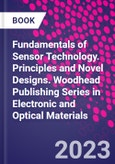Fundamentals of Sensor Technology: Principles and Novel Designs presents an important reference on the materials, platforms, characterization and fabrication methods used in the development of chemical sensor technologies. Sections provide the historical context of sensor technology development, review principles for the design of sensing devices and circuits, delve into the most common chemical and biological sensor types, cover unique properties and performance requirements, discuss fabrication techniques, including defining critical parameters, modeling and simulation strategies, and present important materials categories used in sensing applications, such as nanomaterials, quantum dots, magnetic materials, and more.This book is appropriate for the interdisciplinary community of researchers and practitioners interested in the development of sensor technologies, including materials scientists and engineers, analytical chemists and other related disciplines.
Please Note: This is an On Demand product, delivery may take up to 11 working days after payment has been received.
Table of Contents
Part I. Sensing principles and basic design
1. Historical development of sensing technology
2. Sensor principles and basic designs
3. Fundamentals of Biological Recognition Elements
Part II. Sensing techniques
4. Lab-on-a-chip sensors
5. Potentiometric sensors
6. Amperometric�sensors
7. Fluorescent sensors
8. Surface plasmon resonance sensors
9. Ellipsometric biosensors
10. Impedimetric (bio)sensors
11. Nanostructured photoelectrochemical biosensors
12. Impedimetric biosensors based on nucleic acids
Part III. Sensing materials
13. Metal nanoparticles for sensing applications
14. Carbon nanomaterials for sensing applications
15. Polymer nanocomposites for sensing applications
16. Quantum dots for sensing applications
17. Molecularly imprinted polymer sensors: A bridge to advanced diagnostics
18. Direct glucose fuel cell towards a self-powered point-of-care nanobiosensor
19. Metal chalcogenides for sensing applications
20. Silica nanoparticles for sensing applications
21. Chromo-fluorogenic chemosensory for sensing applications
22. Gold nanoparticle-based biosensing applications
23. Advances in fiber sensing devices decorated with functionalized nanomaterials
Part IV. Recent topics
24. Screen-printed electrochemical sensor platforms
25. Biodegradable sensor platforms
26. Disposable paper-based sensors








